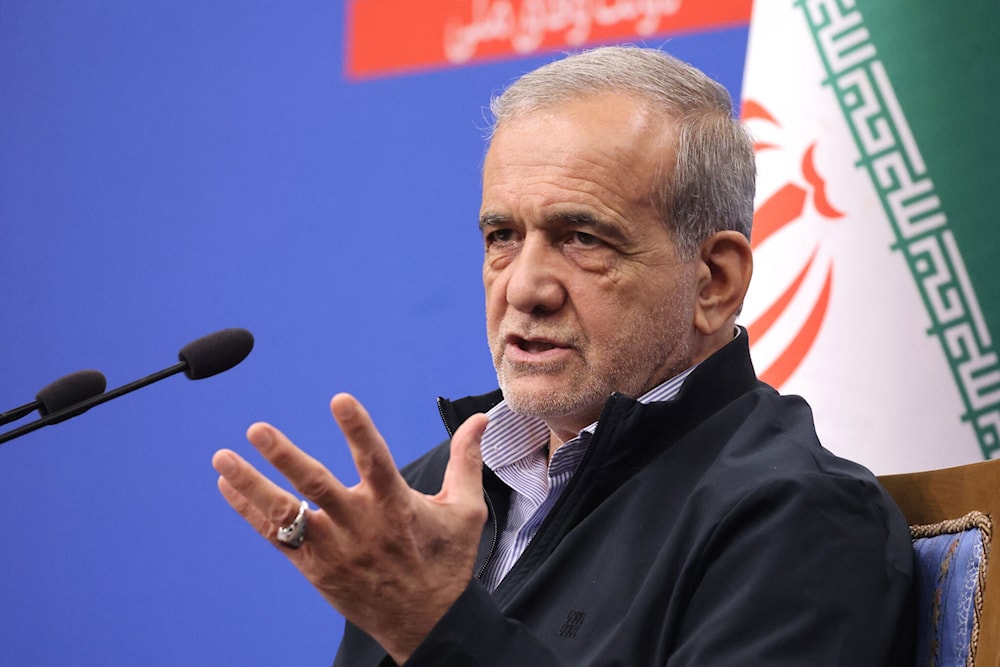Iranian president, FM stress need for dialogue among Syrian factions
The Iranian president says the Syrian people alone must determine the future of their country and its political system.
-

Iranian President Masoud Pezeshkian holds a press conference in Tehran, on September 16, 2024 (AFP)
The Syrian people alone must determine the future of their country and its political system, asserted Iranian President Masoud Pezeshkian on Sunday.
Speaking during a cabinet meeting, Pezeshkian addressed the ousting of Syrian President Bashar al-Assad, after armed groups, now serving as the transitional government forces of Syria, seized control of Damascus on Sunday.
The Iranian president underscored the importance of maintaining Syria's unity, sovereignty, and territorial integrity, emphasizing the need for dialogue among various Syrian factions to reach a mutual understanding regarding the country's future.
Pezeshkian expressed hope for an immediate end to violence in Syria, enabling its citizens to decide their fate without fear or "destructive" external interference.
He also called for the protection of Syrian citizens, holy sites, and diplomatic missions, stressing adherence to international law.
The Iranian president reaffirmed his country’s commitment to engaging in diplomatic efforts with relevant parties and the United Nations to stabilize the situation and safeguard regional security and stability.
Additionally, Pezeshkian condemned the Israeli occupation regime’s aggression on Syrian territory, urging Syrian factions and regional nations to remain vigilant against attempts by "Israel" to exploit the crisis to advance its illegal and expansionist policies.
Iran advised Syrian government to engage in dialogue with opposition
On his part, Iranian Foreign Minister Abbas Araghchi indicated that Syria has played a major role in supporting the Palestinians and the Axis of Resistance, beginning as far back as the Iran-Iraq war in the 1980s.
Speaking about the strong relations between Iran and Syria over the past 40 years, Araghchi highlighted one area of collaboration; "the fight against ISIS, in which Iran played a pivotal role." He noted that this was the primary reason for the Iranian presence in Syria—"to safeguard our national security."
He asserted that Iran has played a key role in combating ISIS in both Iraq and Syria, at the request of their governments, pointing out that "if we hadn’t fought ISIS in Iraq and Syria, we would have had to fight them within Iran's borders."
The top Iranian diplomat stressed that it was clear from the beginning to Iran that the United States and "Israel" sought to entangle the Islamic Republic in successive crises, including in Syria.
Regarding Iran's support for Syria, Araghchi confirmed that Iran supported the Syrian government in matters concerning the country’s internal affairs, its relationship with the people, and its dealings with opposition groups.
He affirmed that "Iran did not intervene but consistently advised the Syrian government to engage in dialogue with the opposition and pursue political and peaceful solutions to resolve disputes."
On recent developments, Araghchi revealed that "President Bashar al-Assad expressed surprise and dissatisfaction with his army's performance" during a meeting with Ali Larijani, the senior advisor to the leader of the Islamic Revolution and the Islamic Republic in Iran.
This indicates that even within the Syrian government, there wasn’t a comprehensive analysis of the army’s situation, the Iranian foreign minister suggested.
He said the Syrian Army was engaged in a "psychological war" before losing on the actual battlefield.
Media warfare and both virtual and real arenas had a huge impact on undermining the Syrian Army’s performance, leading to the absence of serious resistance, Araghchi explained.
He reiterated that Iran supports democratic changes and the aspirations of the Syrian people but pointed out that it is better not to pass judgment on the current situation.
Elsewhere, Araghchi stressed that the Resistance in Lebanon possesses sufficient weapons and capabilities for years to come.
Read more: Int'l, regional reactions to Syria regime change; calls for stability

 4 Min Read
4 Min Read








